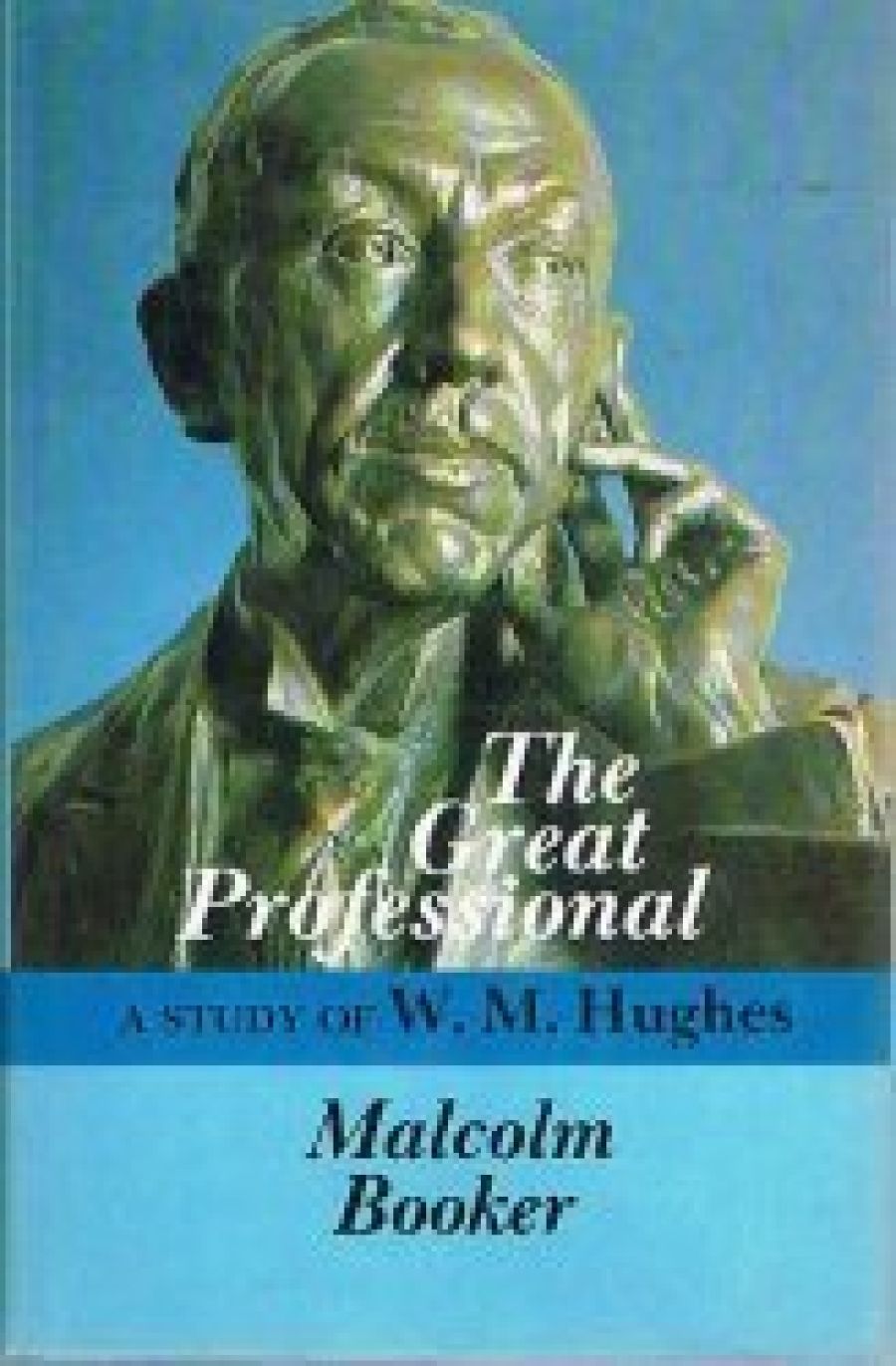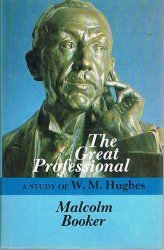
- Free Article: No
- Contents Category: Politics
- Review Article: Yes
- Article Title: Dirty Little Billy
- Online Only: No
- Custom Highlight Text:
More serious works have been written on the life and times of W.M. Hughes than on any other Australian prime minister and, probably, any Australian at all. The little man got off to a flying start with his own books about himself and his amazing adventures, then Farmer Whyte among others came along and, to cap it off, there has emerged the very lengthy two-volume study of Hughes by L.F. Fitzhardinge, among the best and certainly the most elegant of our political biographies.
- Book 1 Title: The Great Professional
- Book 1 Subtitle: A study of W.M. Hughes
- Book 1 Biblio: McGraw-Hill, $14.95 pb, 292 pp
- Book 1 Cover Small (400 x 600):

- Book 1 Cover (800 x 1200):

Before his retirement in 1977, the author spent many years in the Australian foreign service and preceded this book with The Last Domino and Last Quarter, studies of Australia's past and future with its neighbours in the Pacific. One of the many long-suffering citizens who served as private secretary to Billy (there should be a club of them, devoted to keeping Billy Hughes horror stories alive), Booker was both charmed and infuriated by a man who, in a highly characteristic manner, confidently informed Booker of Hughes’s crucial rule in the formation and shaping of all the institutions in Australia that matter. Booker has not written to please the restless shade of Hughes, wherever it is currently striking terror and exasperation, but sought to analyse Billy the politician in the years to 1923, when he ceased to be Prime Minister, partly, argues Booker because it was time for the new men, and Hughes recognized it. Like hell he did: the entire picture Booker paints is of a man who existed only for political power, and supreme power when he could get it.
Booker’s volume is thematic and hence sometimes difficult to read at less than one sitting because soon the reader is having attention drawn to earlier pages, under another heading. These sections are concerned with the migrant in politics, the role of the Catholic church in labor politics, compulsory military training before the Great War, and so on.
The author is especially interesting on the subject of Hughes and socialism. In a chapter entitled ‘Marx or God’ Booker describes the efforts of Cardinal Moran and Catholic church groups in New-South Wales to check the spread of socialist ideas among the people. Instruments in this holy work included a precursor of the National Civic Council called the ‘Anti-Humbug League’ which took an active part in the 1894 New South Wales election, concentrating its attacks on the solidarity Labor candidates and on the socialists.
In the eyes of Hughes, concludes Booker, deploying Patrick Ford's Cardinal Moran and the A.L.P., this represented the first of a series of attempts by the Catholic hierarchy, in unavowed and sneaky ways, to undermine working class support for the Labor party. But requiring to compete with the Catholic church for leadership of the working class, Hughes moved away from the socialist doctrines he had earlier advocated. J.C. Watson and W.A. Holman joined Hughes in this shift to the Right, so that in the 1890s the prospect that socialism would genuinely become the policy of the Labor party in the New South Wales heart-land disappeared. The Socialists in the mother colony became a splinter group, condemned in season and out by the Catholic church and, in the course of time, no less vigorously by W.M. Hughes when he made the splendid discovery that capitalism worked when you came to understand and appreciate its values. Especially was this brought home to him in 1920 when he opened an envelope and out fell a cheque for 25,000 pounds from ‘anonymous admirers’.
Booker concludes that the departure of the radical socialists led to the Labor party largely ceasing to be a party of principle, instead devoting itself to ‘practical politics’. Booker is gloomy on this point, asserting that the cost proved high, for without a solid core of principle and belief, the party was to split again, all its leaders from Watson and Whitlam drifting towards compromise with forces in Australia which the author, apparently without irony, dignifies with the term ‘conservative’.
The Socialists gone, then, the Catholics in New South Wales were enabled to return to the Labor movement in which Hughes was such a dynamo, with Cardinal Moran demonstrating that although the members of his church might never actually secure a political majority in Australia, they yet could exercise a salutary veto over the policies of the parliamentary representatives of the working class. Some came to regard this as high principle, some as the attitude of the nark, others yet again as vital support for those who set their faces against the implications of one value-one vote. No wonder this basis of democracy was to be resisted: it might have led to the sweeping out of the road of the crypto-fascist upper houses and the distinct possibility that the majority of the people might actually elect a government which ran the country.
Booker considers that the all- important Hughes went along with this. Certainly Moran became so obsessed with keeping democrats out of power that he succeeded in excluding them from the federal conventions of the 1890s. However that was, undoubtedly Labor was left to contemplate a Free Trade and Defence Act which came to be hawked up and down the country as a ‘Constitution’, as if it actually contained within it some expression of lofty democratic principles or ideals of justice.
The author is drawn, as he must be, to the Great War and Hughes, and between a third and half of this book is concerned with defence arrangements and the conflict of 1914-18. The main theme here is how Hughes, always a great imperialist at heart, was really in his element at last. Booker makes some important points about the weak government over which Hughes stood head and shoulders in terms of ability, the little man’s extremely shrewd tactics in discrediting the radicals in the party, and the dealings concerning the referendum to give the federal authority increased power. We are informed how Hughes invited himself to London (how very typical of him) but I do not think that Booker fully grasps the significance of one of the really momentous points in Hughes’s life – when he crossed over to France and stood before the A.I.F. that spring of 1916, on the eve of those battles on the Somme which changed everything, not least the use of the English language to describe the indescribable.
Here was a diminutive gnome-like creature who had immigrated to Australia in the utmost obscurity, risen to become a labor leader and then prime minister of a dominion, dined with his Sovereign, rubbed shoulders with the rulers of the greatest Empire since imperial Rome and enjoyed the clamorous support of the Northcliffe press in its campaign against Asquith. And now he faced the flower of Australian manhood and nationhood, made world-famous by their exploits at Gallipoli, and shortly to be chopped to pieces in the mincing machine of the Western Front. Hughes has no camouflage and is at his least devious and most romantic. For perhaps the only time in his political life, he even has a little spare time. Here was fused the imperialism of the little man and his sense of being leader of a nation at war. Hughes was firmly nationalized, so to speak, but within the terms of imperial values. Any remaining socialism not already shed vanished in the heat of imperial and national sentiment as he spoke with great emotion to that doomed body of infantry. That is why Booker is able to write, in terms of Hughes’s great speeches in the conscription campaign later that year, that the prime minister spoke as Demosthenes. Hughes was home at last, about to be finally embraced in the arms of the ugly capitalist forces his heart almost rejected and his head now accepted.
But when all is said and done, and the reader has digested Booker’s analysis of Hughes at home and abroad 1919-23 and considered the significance of domestic legislation then initiated, this book still remains unsatisfactory. I think that the title and the ideological framework (or lack of one) is the trouble. For example, this word ‘professional’ in the title ... I suppose Booker means it in an adulatory sense, or is it a Machiavellian sense as in The Prince? One is not sure. Is there a hidden revelation in the title of this book, prefaced as it is with Mr Neville Wran’s comment that ‘the art of government is staying in power’? Does the term implicitly belittle Hughes instead of praising him, or indeed is the author himself not really sure? What is an ‘amateur’ politician as opposed to one of Booker’s ‘professionals’? In short, it appears sometimes that the author is seeking to clarify his mind by writing this book.
On the whole, Booker seems to focus on his man as ‘professional’ in the sense implied by Wran. For instance, he states that in the period between the defeat of the first conscription plebiscite and his successful landslide victory at the general election of 1917, Hughes exhibited his gifts as a professional politician at their best when he converted his loss to a strength. This will not do. The people wanted to be on the winning side in the war, Hughes was quite clearly the only war leader in Australia, and so he was bound to win a general election. The thing was that Australians did not want to win at the cost of a painful dose of conscription. But that, and its implications, is another story.


Comments powered by CComment